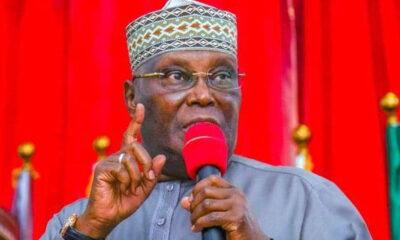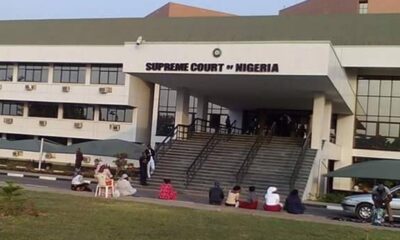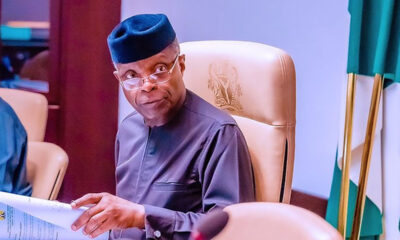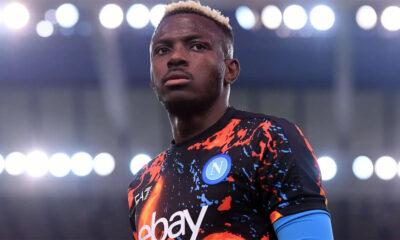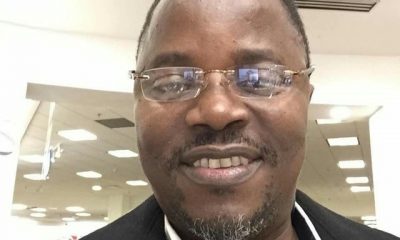Opinion
Of Kings, King Kong and honour

Of Kings, King Kong and honour
By Tunde Odesola
(Published in The PUNCH, on Friday, November 8, 2024)
Since 1933, when it hit the cinemas in the United States, the classic movie, King Kong, has undergone no fewer than 13 remakes. King Kong is a giant prehistoric ape ruling the mysterious Skull Island, where he is worshipped by dinosaurs, plesiosaurs, pterosaurs and numerous other monster creatures.
In the 1933 version, the story begins when an ambitious filmmaker, Carl Denham, takes his cast to Skull Island in the Indian Ocean territory for a jungle shoot, and the First Mate (assistant captain) of the ship, John ‘Jack’ Driscoll, falls in love with the deuteragonist, Ann Darrow. A deuteragonist is the second lead character while the protagonist is the lead character in a drama or movie.
The blond and beautiful Ann is captured by Skull Island natives who offer her to their king as a befitting sacrifice, setting humans and animals on a collision course which encapsulates the themes of man’s perpetual violation of nature, racism, exploitation, fear and love.
More powerful than any monster ever, the 25-foot tall King Kong falls in love with Ann, and gingerly holding her in his palm, remains determined to protect Ann from love-struck Jack and other crew members trying to rescue her. Though he’s a beast, King Kong navigates the intersection between primal instinct and civility by exuding love for blondie Ann, a human being, smoothening the jagged edges of animal-human borders.
In violation of nature, the crew captures King Kong, the protagonist, ships him to New York, and presents him to Broadway theatre audience in an exhibition dubbed “Kong, the 8th Wonder of the World,” with Jack and Ann posing beside Kong, rendered unconscious by a gas bomb since he was captured on Skull Island.
The blinding light from photographers’ cameras irritates the dazed Kong, who breaks loose, wrecking buildings, trains, vehicles, public utility poles and cables etc, as he picks Ann up like a piece of fried plantain and makes a dash for the 102-storey Empire Building which he climbs to the zenith.
Four planes face King Kong with fire, trying to shoot him off the building. He places Ann, his beloved, in a safe place and faces his adversaries, swatting and destroying one of the planes. In destroying the plane, Kong is injured while the gunfire intensifies. Momentarily, Kong takes his eyes off the planes and looks towards Ann, a fatal error that enables the three other planes to have good shots at him. He falls off to the ground, where a bewildered crowd quickly gathers in the final moments.
Fittingly, Jack reunites with his love, Ann. Denham, who makes his way to the scene of the fallen beast, overhears a policeman saying the planes got Kong, but he responds, “Oh, no, it wasn’t the planes. It was Beauty that killed the Beast.”
There are kings and there are kings. King Kong ruled his Skull Island. The eagle rules the air. The elephant rules the jungle. The blue whale rules the sea. I know an oba in Osun who rules with dignity and honour on the àpèrè of his forefathers.
Genealogically, the road to the palace is not paved with gold alone. It is also caked in the blood of revolution and hate. Faced with dwindling economic fortunes, the high cost of monarchy, political upheavals and the appeal democracy offers, many countries have consigned their kings and queens to the dustbin of history.
On January 21, 1793, King Louis XVI lost both his crown and head to the guillotine – in the aftermath of the 1792 French Revolution, making him the last monarch to live in the Palace of Versailles, taking to his grave the fitting nickname of ‘Louis the Last’.
The ruler of Russia, Tsar Nicholas II, bit the dust during the Russian Revolution of 1917, drawing the curtain on monarchy in the Soviet country. And in 1918, after World War I, Germany kicked out its king, Kaiser Wilhelm I, and locked the palace forever. After Mussolini fell and a republic was established in 1946, a referendum nailed the coffin of monarchy in Italy just as China transited to a republic in 1912 during the Xinhai Revolution which abolished the Qing Dynasty.
Brazil sacked its king in 1889 after a republican military coup while Greece showed King Constantine II the exit door of the palace in 1973, following a referendum by military coupists. But Spain, which abolished monarchy between 1931 and 1939, restored it in 1947. Indeed, red and gold are the road to the palace.
In the 20th Century, monarchies were abolished in Afghanistan (1973), the Ethiopian monarchy that lasted for almost 3,000 years ended with Haile Selassie in 1974, Vietnam (1945), and Iraq (1958). Recently, Nepal and Barbados kicked out the monarchy in 2008 and 2021 respectively.
Unlike Africa and Europe, monarchy remains strong and vibrant in the Middle East though social reforms are gradually tempering the sword of absolutism with change.
In Nigeria, the desirability or otherwise of monarchy is like the waves of the sea, rising and falling, peaking and ebbing, a mixed bag of the Good, the Bad and the Ugly.
Among the Ugly is the Canada-returnee jailbird king who oversmokes Indian hemp, beats his wife and royal colleague, and fights culture and tradition; a madcap desecrator of the throne who will never heed the caution of the odíderé until he perishes.
Among the Bad are the kings who run errands for politicians and support bad government policies – like that Abacha-dark-goggled king who advised the Igbo to go and perish in the lagoon so that the son of the owner of the brass mortar may reign. As a lover of culture, I won’t call for the abolition of monarchy in Nigeria though the temptation is high.
There are many good kings in Yorubaland, though the eyes cannot miss some black sheep among the flock. But lest I be accused of nepotism, I’ll name one oba in Osun, my state of origin, though Lagos is my state of birth; I’ll name one oba in Ondo, one in Ogun and one in Oyo as exemplars of nobility. This is not to say there are no good kings in Lagos and Ekiti states. There are many, but I’m probably not close enough to them – to talk about them.
At times, I wonder how lucky the Ekimogun people of the Ondo kingdom are by having as the Osemawe, Oba Adesimbo Kiladejo. Another worthy king I know is the late Towulade of Akinale kingdom in Ogun State, Oba Olufemi Iyanda Okesooto Ogunleye, journalist and lawyer, who died on June 19, 2024, after bagging a PhD at 80.
On October 22, 2024, I was strolling on Facebook Street when I saw a post by Diran Odeyemi, a popular Peoples Democratic Party chieftain in the South-West. The post says, “Do you know this school? Abolarin College, Oke-Ila, Osun State. No school fees. Free hostel. Free food. Free internet. Free uniform. Free laptop for every child. 24/7 power supply. All paid by the town’s king. The king teaches too in the school. We should celebrate such a Nigerian. What makes this school remarkable is that one major criterion for getting admitted is being poor. If your parents are rich, you cannot get admission.
Unlike other schools, Abolarin College wants poor kids who are very brilliant. From what I gathered, the king has only one wife. He’s not using the money of the kingdom to accumulate wives or properties.
Every Osun journalist worth their salt knows Oba Abolarin, whose nickname is Doxy. I got to know the 66-year-old king when I worked in Osun. I know his school, too.
I know students from the North, East and West of Nigeria are in his school. I also know he has two first degrees – one in Political Science, the other in Law – both from the Obafemi Awolowo University, Ile-Ife.
As an honourable king and ègbón, I know Doxy up-close; he’s highly cerebral and doesn’t brook conflict or crave attention. Like the almighty sun in heaven that dries up wet clothes on earth, you will see the actions of Doxy without seeing his person.
Two other Nigerians whose actions pleasantly shocked me in recent times are the Asiwaju of Igbajoland, Chief Adegboyega Awomolo, and a former House of Reps member from Ogun State, Hon. Lanre Laoshe, both of whom refunded a Federal Government student loan they received in the 1970s.
Asiwaju means leader and Awomolo leads on many fronts. He is Osun’s first Attorney-General and Commissioner for Justice as well as Osun’s first Senior Advocate.
He told me in an interview that he had been contacting the Office of the Accountant General of the Federation since 2012 to pay his student loan indebtedness but no official told him what account to pay into, adding that each time he saw his loan affidavit, he became weighed down.
“The idea behind student loans is good. I commend President Tinubu for resuscitating the scheme. I spoke with four different Accountant Generals of the Federation since 2012 when I wanted to pay N50k.
“In 2018, I wanted to pay N1m, but I just followed God’s direction and I’ve now paid N2m for a loan of N1,000 I took in 1975 If NEFUND wants me to pay more, I will.”
Laoshe, who took a student loan of N1,200 in 1976, repaid N3.1m, reportedly using a table of average annual exchange rates from 1972 to 1985 from the Central Bank of Nigeria to calculate what he owed the government.
My father and mother didn’t owe student loans. Please, ask your parents to pay up if they are owing. As we, the masses, hold government accountable, we should look at ourselves, too. Surely, Nigeria needs more men and women with conscience.
Email: tundeodes2003@yahoo.com
Facebook: @Tunde Odesola
X: @ Tunde_Odesola
Opinion
NNPCL: Ojulari’s ambitious five-year $60bn investment agenda
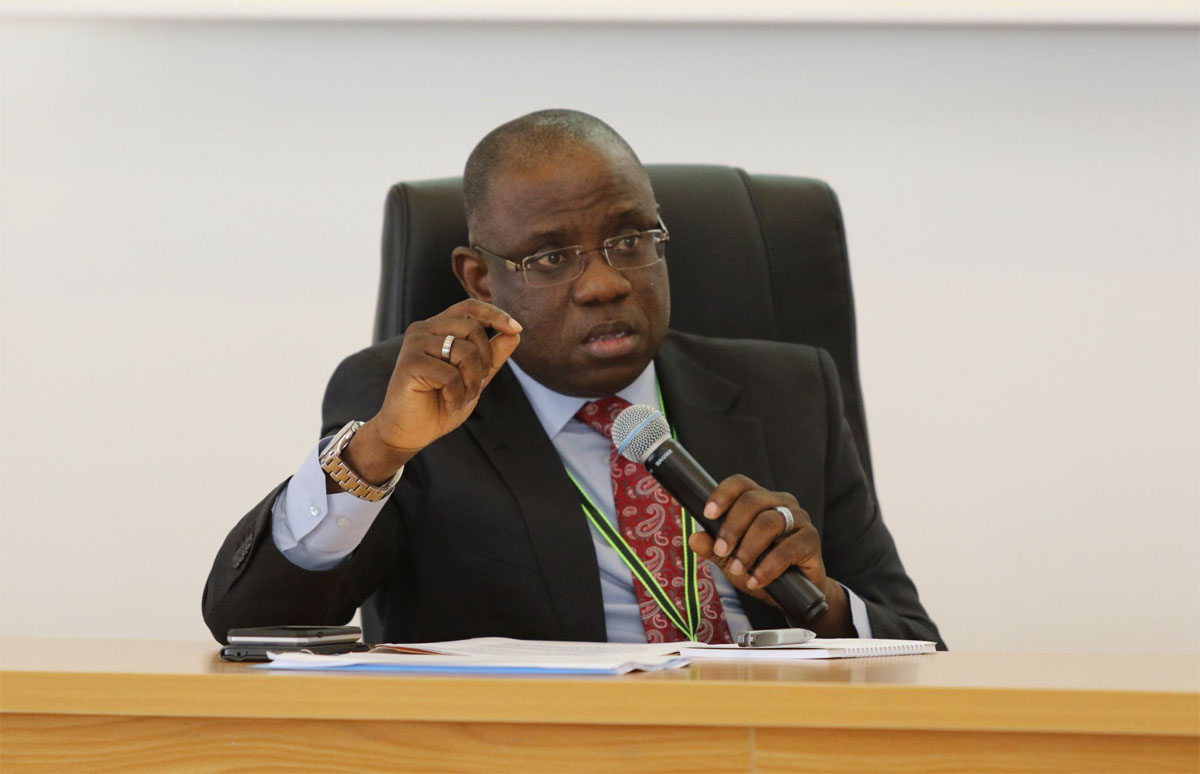
NNPCL: Ojulari’s ambitious five-year $60bn investment agenda
On Thursday, the Nigerian National Petroleum Company Limited (NNPCL) unveiled an ambitious five-year growth and development agenda that will see it attracting $30 billion investments by 2027 and $60 billion by 2030. Group Chief Executive Officer (GCEO), Bayo Ojulari, who assumed leadership of the NNPCL just two weeks ago on April 4, disclosed this and more to members of staff during a town hall meeting held at the NNPC Towers in Abuja. What happened that day can be described in other words as the unveiling of the agenda of the new sheriff at the NNPCL and the direction which he wants the national oil company to go in terms of focus, vision and developmental plans under his watch.
If the 48 year old national oil company, founded on April 1, 1977 has been crawling all these years, it has now announced its readiness not just to start walking but get into running mode, preparatory to flying.
In a detailed press statement signed by the Chief Corporate Communications Officer, Olufemi Soneye and made available to newsmen, Ojulari, the new set man at NNPCL was as clear and emphatic as he could possibly be when he declared that the NNPC Ltd under his stewardship aims to attract sectorial investments worth $30 billion by 2027 which it will ultimately scale up to $60 billion by 2030; raise crude oil production to over two million barrels per day which it hopes to sustain through 2027 and attain three million by 2030; expand refining output to 200kbpd by 2027, and 500kbpd by 2030; grow gas production to 10bcf per day by 2027, and 12bcf by 2030 and deepen energy access and affordability for all Nigerians. This is certainly sweet music to the ears.
o avoid sounding as if he would simply wave some magic wands to achieve these lofty targets, Ojulari spelt out what must be done to arrive at the Promised Land. According to him, the company will be focusing on reconfiguring its business structure for agility and value creation; conducting independent value assessments to inform data-driven decisions; enforcing a robust performance management framework; building transparent, value-aligned partnerships with all stakeholders and most critically, taking control of its narrative.
The GCEO was meticulous in explaining the imperativeness of pursuing the company’s bold and ambitious agenda. Ojulari declared that the targets are not just metrics, but indicators of hope, jobs, industrial growth, and energy security for millions of Nigerians.
Describing NNPC Ltd as a renewed, forward-facing, and future-ready organisation that is proudly leading Nigeria’s energy transformation, Ojulari declared that “it’s time we tell our story—one of innovation, reform, and national pride.”
In what sounds like a new dawn at the NNPCL, Ojulari challenged the staff to be proud of NNPC Ltd’s recent transformation, stressing that the next journey to becoming a fully-fledged limited liability company will require a collective drive towards making NNPC more transparent, profitable and accountable.
READ ALSO:
- Osimhen to rake in N136bn from Man United
- U20 AFCON: Flying Eagles tackle Young Pharaohs in friendly
- Our states under bandits siege, forests taken over – Benue, Plateau govs
Ojulari then made a solemn pledge to give all employees the space to thrive and be able to outperform competitors in the oil industry, at least in Nigeria. “We will provide the best combination where the experienced and the young will both thrive towards achieving our set targets,” he assured.
He also did not overlook the work environment as he promised that his management will deepen collaboration with the company’s in-house and national unions to build a stronger, trust-based relationship that reflects shared purpose and mutual respect. He also called on all staff to lead with integrity, act with urgency, while bringing their very best to the table.
“We recognize that our greatest asset is our people. Our success will be powered by empowered employees. As such, we are fully committed to creating a workplace where everyone is valued, motivated, and inspired to thrive. Together, we will build a high-performing, globally competitive NNPC Ltd that is proudly Nigerian and proudly world-class,” Ojulari stated.
He vowed to pursue the company’s bold ambition and build an NNPC that will be the pride of all Nigerians.
“We stand at the gateway of a new era—one that demands courage, professionalism, and a relentless drive for excellence. The task before us is great, yet the opportunity to redefine Nigeria’s energy future is even greater. Now is the time to turn our transformation promise into performance,” Ojulari submitted.
Considering the pre-eminent position the NNPCL occupies in driving of the Nigerian economy, it would not be out of place to say that the appointment of Ojulari as the new GCEO of the national oil coy happened at the right time and marks a pivotal moment for Nigeria’s oil and gas sector. With a bold plan to attract $60 billion in investments over the next five years, Ojulari’s leadership is poised to significantly impact the nation’s economy, particularly in the context of President Bola Tinubu’s ambitious vision of transforming Nigeria into a trillion dollar economy. Ojulari’s multifaceted agenda which includes increasing oil production to 3 million barrels per day (bpd), increasing NNPCL’s crude refining capacity, enhancing gas production, and fostering a culture of accountability and transparency within the organization are all steps that should yield the desired result if pursued with the same vigour and passion with which they were reeled out, and there is no doubt that he would want to leave his foot print in the sands of time at the NNPCL.
READ ALSO:
- (UPDATED) 5 dead, 13 injured in Gombe Easter Monday auto crash
- FG to close Ijora Bridge for repairs April 27
- Zamfara residents broke after paying N500m to bandits
Ojulari’s planned strategy of ramping up oil production is to ensure that the NNPCL is able to not only meet domestic energy needs but also position Nigeria as a key player in the global oil market. This increase in production is essential for generating the revenue required to fund national development projects and social programs. Furthermore, it will create jobs and stimulate economic activities across various sectors, from transportation to manufacturing, thereby contributing to the overall growth of the economy.
In addition by prioritizing gas production, he aims to leverage the country’s vast reserves to meet both domestic and international demand. This focus on gas not only aligns with global energy transition trends but also provides an opportunity for Nigeria to continue to upscale its diversification of her energy portfolio. Increased gas production can lead to the establishment of gas-based industries, which can further drive economic growth and create employment opportunities.
An important point to note in Ojulari’s leadership philosophy is the emphasis on accountability and transparency. By fostering a culture of openness within NNPCL, he aims to rebuild trust with stakeholders, including investors, government agencies, and the public. This commitment to transparency is crucial for attracting the $60 billion in investments needed to realize his ambitious plans. Investors are more likely to commit capital to an organization that demonstrates integrity and a clear commitment to ethical practices. Moreover, accountability within the organization can lead to improved operational efficiency, reducing waste and enhancing profitability.
Staff motivation and welfare are also central to Ojulari’s agenda. Recognizing that a motivated workforce is essential for achieving organizational goals, he has vowed to implement initiatives that prioritize employee well-being and professional development. By investing in training and creating a conducive work environment, Ojulari aims to empower NNPCL employees to perform at their best. This focus on human capital development will not only enhance productivity but also foster loyalty and reduce human capital quick turnover, ultimately benefiting the organization and the economy at large.
Another critical aspect of Ojulari’s agenda is the plan to foster collaboration and dialogue with labor representatives. This approach certainly will engender a more harmonious and peaceful working environment, reducing the likelihood of industrial disputes that could disrupt operations and hinder progress.
What Nigerians are about to witness in Ojulari’s leadership at NNPCL promises to be a comprehensive and forward-thinking approach to the challenges facing Nigeria’s oil and gas sector. His plans to attract significant investment, increase production, and foster a culture of accountability and employee welfare are certainly essential if as a major player in the nation’s economy, President Bola Tinubu’s vision for a trillion dollar economy within a decade is to be realised. If he can effectively execute this vision, Ojulari certainly will not only transform NNPCL but also contribute significantly to Nigeria’s economic growth and development.
NNPCL: Ojulari’s ambitious five-year $60bn investment agenda
Opinion
Tinubu’s Lagos-centric Yorubaization of Nigeria, By Farooq Kperogi

Tinubu’s Lagos-centric Yorubaization of Nigeria, By Farooq Kperogi
Last week, in response to mounting, difficult-to-controvert, empirically impregnable accusations that President Bola Ahmed Tinubu disproportionately favors his Yoruba ethnic group in consequential federal appointments, the presidency circulated a list of Tinubu’s appointments to countermine the firmly fixed national narrative of Tinubu’s unexampled ethnocentrism but was compelled to withdraw it because it was embarrassingly error-ridden and factually inaccurate.
Sunday Dare, the President’s Media Adviser on Media and Public Communication, tweeted on April 10 that the presidency had “noticed a number of errors in the list of appointments tweeted,” said they were “sorry,” and that they would “provide an updated list later.”
More than a week later, we haven’t seen the updated list that Dare promised, which will supposedly show that, in spite of incontestable evidence to the contrary, Tinubu’s appointments reflect fairness to the ethnic and regional complexities of Nigeria and that the Yoruba people don’t dominate appointments and control the commanding heights of the economy.
Interestingly, while the presidency is still updating its list and eating humble pie, a more damning list of Tinubu’s appointments has emerged. It is longer and shows an even more indefensibly insidious, not to mention unexampled, ethnocentric capture of the major levers of government.
Again, while we are awaiting the updated list of Tinubu’s appointments that shows evidence of a fair distribution of federal appointments, the government chose to undermine itself and provide additional ideational ammunition for his critics who say he is beholden to advancing the unfair dominance of his ethnic group.
On April 16, the administration announced the formation of an eight-member committee to oversee preparations for the national census. Of the eight, five were Yoruba. In a country comprising over 500 ethnic groups, such a configuration reflects a troubling insensitivity to the symbolic and political weight of representation, especially in a matter as contentious and identity-laden as a national headcount.
The exclusion of the northeast, southeast, and south-south from the committee cannot be dismissed as oversight. Nor can the disproportionate Yoruba presence be defended as incidental. The demographic sensitivities surrounding census exercises in Nigeria are historically fraught.
That the president’s team would assemble a committee so lopsided at such a politically volatile time betrays either a stunning lack of political judgment or a deeper confidence that no consequence will follow such overt ethno-regional privileging. Either way, the signal is unmistakable and deeply corrosive.
Equally emblematic was the decision to have the president’s Chief of Staff, Femi Gbajabiamila — a fellow Yoruba and an unelected official whose role has no constitutional standing — inaugurate the committee. This move, while procedurally permissible, was laden with semiotic overreach.
READ ALSO:
- Nigerian Army appoints Onyinyechi Anele as first female spokesperson
- Youths attack Fulani settlement, accuse residents of aiding bandits
- Obi is a social media candidate, can not win election – Wike
The constitutionally designated deputy of the president, Vice President Kashim Shettima, a northerner, was bypassed despite being present in the country. The optics communicate the message of an informal inner circle displacing formal constitutional roles, with ethnicity as a defining axis of inclusion and exclusion.
For an administration straining excessively hard to convince a skeptical nation that the evidence of ethnic bigotry in governance that stares them in the face isn’t what they think it is, gestures like this do not merely raise questions; they answer them in ways that deepen cynicism and confirm suspicions.
I think honchos of the Tinubu administration shoot themselves in the foot and expose themselves to ridicule when they try to defend the administration’s Yoruba-centric favoritism because their rhetoric is often hysterically at variance with the evidence.
They have two options. The first option is silence. There is more dignity in silence than lies, easily refutable lies. It’s better to be thought a fool, as the saying goes, than to open your mouth and remove all doubt.
The second option is to be bold and point out that Tinubu is merely expanding the ethnocentric path that Buhari paved. In several previous columns where I railed against the Arewa-centric favoritism of Buhari’s appointments, I repeatedly warned that Buhari’s southern successor would expand on his bigotry and that defenders of Buhari’s favoritism who insulted me would have no moral pedestal to stand on when that happened.
That time has come. To be frank, I am enjoying seeing people who defended, explained away, or ignored Buhari’s favoritism (because they imagined that he would be in power for ever) squirming and complaining of Tinubu’s more expansive, unapologetic ethnic capture of the levers of government.
When you initiate an action, you can’t determine the nature and contour of the reaction. Saying Buhari was less exclusionary than Tinubu is now is a weak charge. Buhari shouldn’t have started it, and the people who defended him or looked away should have known that this moment would come.
Of course, the people who benefit from or who defend Tinubu’s unabashed Yoruba-centrism should be aware that, like Buhari’s Arewa-centrism, it also has an expiration date, and that the successor to it may be worse than it.
Defenders of the narrow-mindedness of the Tinubu regime should also be aware of other unintended consequences of their ethnic triumphalism. Just like Buhari has caused the Fulani (including poor, innocent ones) to be reviled all over Nigeria, everyday Yoruba people who also suffer the consequences of Tinubu’s economic policies, will be targets of transferred aggression.
READ ALSO:
- Kyiv receives 909 bodies of Ukrainian soldiers
- APC to Kwankwaso: Apologise to Tinubu, Shettima before joining our party
- Police arrest 3, recover after busting Imo IPOB terror hideout
Like the Fulani, the Yoruba may become the objects of undeserved and unearned ethnic hate on account of the president’s inability to see beyond this ethnic enclave in appointments and symbolic actions.
It doesn’t matter that, like a Yoruba friend tells me each time this issue comes up, Tinubu’s outward Yoruba-centrism actually masks a more exclusionary Lagos-centrism. He says most of the Yoruba people Tinubu appoints to important positions have connections to Lagos.
I don’t doubt him. In fact, in a January 24, 2024, column titled, “North and Tinubu’s Back-to-Lagos Moves,” I made that point.
“With a few notable (and in some cases unavoidable) exceptions, Tinubu’s government is largely the re-enactment of his time as the governor of Lagos,” I wrote. “It is, for all practical purposes, an unabashed Lagos-centric Yorubacracy. To be fair, though, with the possible exception of Olusegun Obasanjo’s administration, all civilian regimes since 1999 have been insular ethnocracies.”
I should also point out that in spite of appearances to the contrary, many well-informed, cosmopolitan Yoruba people are embarrassed by Tinubu’s unabashed favoritism toward Yoruba people at the expense of other ethnic groups.
For example, when Tinubu was considering Bayo Ojulari as the Group Chief Executive Officer of the Nigerian National Petroleum Company Limited, it was a Yoruba man who is close to the Tinubu power orbit, who reached out to me, giving me the privilege to be the first person to break the news months before it was officially confirmed.
In my widely shared December 28, 2024, column titled, “Tinubu’s Buharization of the NNPC,” I wrote the following:
“Ironically, this column was inspired by a well-regarded Yoruba supporter of President Bola Ahmed Tinubu who is worried, in fact embarrassed, by the optics of what he says is Tinubu’s relentless Yorubacentric take-over of the Nigerian National Petroleum Company (NNPC).
“His concern wasn’t just partisan discomfort; it was a profound unease about how this nepotistic approach undermines national cohesion.”
However, after I discovered that Ojulari is a northern Yoruba, not a Southwestern Yoruba as my source had thought, I wrote a follow-up column (see “NNPC and Fresh Perspectives on Ojulari’s Identity,” January 04, 2025) to clarify my position and to argue that it’s disingenuous to deny the northern identity of northern Yoruba people only when they benefit from the representational benefits of being northerners.
As I have argued many times in the past, appointments are the symbolic conduits through which citizens relate to governments. That is why representational justice is crucial for a complex, multi-ethnic country like Nigeria.
However, since our national leaders have historically chosen to find comfort only in their ethnic and regional cocoons and to abandon the hard task of building bridges and integrating our disparate but entirely collapsible identities, we will continue to sink deeper and deeper into the low watermarks of exclusion and bitter divisions.
Farooq Kperogi is a renowned Nigerian columnist and United States-based Professor of Journalism
Tinubu’s Lagos-centric Yorubaization of Nigeria, By Farooq Kperogi
Opinion
Eedris ‘teargasses’ Tinubu; Ali Baba ‘besaints’ Obasanjo

Eedris ‘teargasses’ Tinubu; Ali Baba ‘besaints’ Obasanjo
Tunde Odesola
(Published in The PUNCH, on Friday, April 18, 2025)
Nose – off-centre; mouth – misshapen; eyes – squinted; ears – rabbity; every Nigerian is familiar with this green face without a grin. On the green face, teary streams gutter down the sides of the nose, towards the nostrils, coursing to the chin. This is Nigeria and its map.
The tears streaming on each side of the green face typify the River Niger and River Benue, which meet at the base and confluence of the nose at Lokoja, meandering through Onitsha and the Niger Delta – the chin of the Nigerian face.
Death is the cessation of life. To die, in the Hausa language, means ‘ya mutu’. I don’t need the letter ‘d’ in the ‘death’ referenced in the preceding sentence, but I will use the letter ‘y’ in the ‘ya mutu’ phrase. After centuries of running deep, River Niger and River Benue have etched a big letter ‘Y’ on the Nigerian map.
The northern and southern protectorates of Nigeria were amalgamated in 1914. Today, an x-ray of the letter ‘Y’ engraved by the two longest rivers on the Nigeria map, more than ever before, shows the frayed thread of colonial suture, threatening to rip apart. Successive leaders chanted CHANGE, but both rivers are drying up due to climate change. The discernible warned before polls; now we can all see that they pay lip service to Nigeria and global warming.
For ‘Ya mutu’ not to be written as an epitaph for Nigeria soon, the threat to the riverine ‘Y’ on the Nigerian map should be taken as a call for national rebirth. Rivers are natural sources of rejuvenation, but the ‘Y’ of the two rivers that geographically suture Nigeria together is a yoke. Let’s break the yoke!
A grandmaster of Nigerian comedy, Atunyota Alleluya Akpobome, is an influential personality. Popularly called Ali Baba, the ace comedian earns a living cracking ribs. In doing his job, Ali Baba mimics and distorts reality. In distorting reality, he could change the letter ‘y’ in his name, Atunyota, to ‘r’, thus becoming Atunrota. In the Yoruba language, Atunrota means someone who fools people, and Ali Baba fools his audience with his crazy jokes.
READ ALSO:
- FG secures release of 6 women arrested for human trafficking in Cape Verde
- Trump mulls closure of US embassies in Africa
- Breaking: Virgil van Dijk signs new contract at Liverpool
On April 1, last year, Ali Baba came out with a viral post, saying his family had been blessed with a triplet. With the viral post emerging on April Fools’ Day, I had thought, “This Atunrota man can’t fool me.” But, lo and behold, Ali Baba wasn’t fooling, he was for real – he had truly become Baba ibeta.
Ali Baba was born on June 24, 1965, inching within a scraping distance of 60. I don’t know what fascination he has with April, but he has come out with a viral video in April 2025. In the video, Ali Baba, who spoke in a podcast, “Outside the Box,” revealed the political tactics of ex-President Olusegun Obasanjo.
Initially, I was cautious. Was Ali Baba in his prankish element? I asked myself repeatedly as I watched the video. No. Ali Baba wasn’t kidding. To show his seriousness, he asked the host if he could read from his phone, and he fished it out of his pocket and read out the private chat he had with Baba Obasanjo.
Since Ali Baba attained national prominence many years ago, trust has been the bedrock of his career. He is friends with many of Nigeria’s Who’s Who. My bosom friend, Duke Orusara, an Urhobo like Ali Baba, told me Atunyota means ‘Let us say the truth’. I believe Ali Baba was saying the truth in his podcast on OBJ.
In the interview, Atunyota recalled that Obasanjo had thought he was going to run for an elective post. So, OBJ gave Ali Baba the template needed to win a presidential election in Nigeria.
With the headline, ‘Infiltrate parties, secure governors’, Alibaba outlines Obasanjo’s political strategies for winning election, The PUNCH, on April 6, 2025, published the story of the podcast.
According to the podcast, Obasanjo told Ali Baba how to violate Nigeria’s electoral process and win fraudulently. Either as a joke or as an expression of the Nigerian reality, Obasanjo’s teaching in the podcast showed the truth of Nigerian politics. It showed the minds of those who lead the country and why Nigeria can never attain development. Obasanjo sees power as grabbable, Tinubu sees it as snatchable, Muhammadu Buhari sees it as a birthright, Goodluck Jonathan sees it as a toy, and Nigeria tumbles downhill.
To win a presidential or governorship election, Obasanjo counselled Ali Baba, “You need seven governors to win an election: Lagos, Bayelsa, Delta, Rivers, Kano, Kaduna and the CBN governor.”
When Ali Baba reminded him Kano and Kaduna do not have money, Obasanjo said that the two states were for numbers, just as money was for numbers, too.
Reading further, Ali Baba quoted Obasanjo saying, “You need 44 of the most popular senatorial districts. You need to have awarded 10 contracts, and 15% of those contracts can give you a marginal impact at the polls. And you must award this contract in your first year of assumption of office.
“If you don’t do that, then you can’t ask the people for anything because when you give them at the first year of your getting into office, when it’s time for elections, you just tell them ‘Do you want to continue this contract or…?”
READ ALSO:
- Bayelsa lawmaker, Wike’s ally exchange blows amid tension over scheduled event [VIDEO]
- How Obasanjo, Jonathan, Buhari paid lip service to power sector – Minister
- Hoodlums attack Senator Natasha’s family residence in Kogi
According to Alibaba, Obasanjo also advised that pending cases of corrupt former governors who are ‘loaded’ should be suspended, even as Obasanjo advised him to have a hand in appointing all ruling and opposition parties’ chairmen.
Obasanjo was the man who said his kinsman and winner of the June 12, 1993 presidential election, Chief MKO Abiola, wasn’t the messiah Nigeria needed, after the business mogul and politician had been killed for winning the freest election in the nation’s history. His eight-year democrazy rule laid the foundation for the sky-high corruption bedevilling the Fourth Republic today. Anytime Obasanjo speaks, I see the ostrich, its buried head and exposed rump.
Now, come with me to Bourdillon, the Tinubu family house, where I’ll drop by to see Seyi, the son of the President.
Knock, knock, knock on Bourdillon gate.
“Hello.”
“Yes, how may I help you?”
“My name is Tunde, a journalist; I’m here to see Seyi.”
“Seyi?” Which Seyi?
“Seyi Tinubu, the President’s son.”
“Ha! You call Arole by name!? Who are you?”
“Yes, Seyi is a public figure and the son of our President, but I’m older than him.”
“Older than him? OK! He’s in Aso Rock; tell your age to take you to Aso Rock, Methuselah.”
(Slams the gate!)
At 39 years of age, I had expected Seyi to be weaned off his father’s apron strings and stand on his own like the other children of the President, who don’t live in the shadow of their father.
Seyi and his elder sister, Folasade, are the most politically exposed children of Tinubu. Officially, Folasade, in her post as the Iyaloja General of Nigeria, is the head of all market women in Nigeria. But Seyi presents like a catalyst. Seyi caresses the girth of power and hugs the width of wealth, thinking his father’s mystique will protect him from political arrows. He goes to the sea yet despises the splash of water.
In chemistry, a catalyst is a substance that speeds up a chemical reaction without itself being consumed in the reaction. A catalyst can be likened to a baker who works in a bakery without feeling the heat. Seyi wants to be seen as a smooth operator – he goes everywhere sandpapering the atrocities of his father’s reign and feathering his own nest.
Seyi lives in Aso Rock with his father. He’s much more visible than the First Lady, Mrs Remi Tinubu, inspecting a brigade of honour here and breaking Ramadan fast there. Seyi is more visible than any minister, Tinubu’s chief of staff and advisers. Seyi seems to be operating an invisible Office of the First Son. Seyi is looking for something on Lagos beach. It is a needle. Seyi needs his father and his wisemen to find the needle and raise his hand up in 2027.
The Office of the First Son is powerful. It’s more powerful than any government ministry or agency. That’s why the lickspittles at the Nigerian Broadcasting Commission lashed out at hip-hop singer, Eedris Abdulkareem, banning his song, “Tell Your Papa,” which lampoons the Tinubu administration.
Declaring ‘Not-To-be-Broadcast’ fatwah on the viral song, the NBC quoted Section 3.1.8 of its code, saying, “This section prohibits content deemed inappropriate, offensive, or in breach of public decency from being aired on Nigerian broadcasting platforms.”
In its ban order to all broadcasting stations in the country, the NBC woefully failed to mention just one word or phrase or clause or sentence in Eedris’ song that breached the NBC Code.
Eedris’ song says nothing new. The song is a lamentation of the sufferings Nigerians daily go through amid government’s insensitivity, telling Seyi to tell his father that Nigerians are suffering, after all, “omo ina la n ran sina,” literally meaning, “It is the son of fire that is sent to fire.”
If Seyi has the right to defend his father, Eedris also has the right to protest the bad policies of the Tinubu government affecting him.
Obasanjo banned Eedris’ song, “Jagajaga”, Tinubu bans “Tell Your Papa;” hypocrisy has caught OBJ and Jagaban in the same bed.
Email: tundeodes2003@yahoo.com
Facebook: @Tunde Odesola
X: @Tunde_Odesola
Eedris ‘teargasses’ Tinubu; Ali Baba ‘besaints’ Obasanjo
-

 Aviation3 days ago
Aviation3 days agoBola Tinubu int’l airport to resume flight operations April 23
-

 International2 days ago
International2 days agoBreaking: Pope Francis dies at 88 – Vatican
-

 metro2 days ago
metro2 days agoHow Nigerian hotelier died during wife’s 60th birthday celebration
-
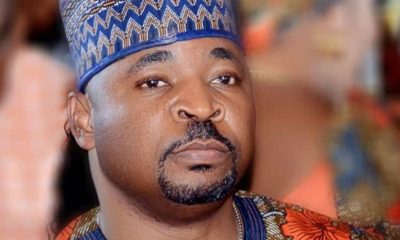
 metro23 hours ago
metro23 hours agoBring your children to compete with mine, MC Oluomo challenges those mocking his spoken English
-

 Politics3 days ago
Politics3 days agoMalami, others in CPC started plotting against Tinubu in 2024 — Obono-Obla
-

 Sports3 days ago
Sports3 days agoCelebrity boxing bout: Burna Boy gifts Portable N20m for defeating Speed Darlington
-

 Railway3 days ago
Railway3 days agoWhy we extended suspension of Warri-Itakpe Train Services – NRC
-

 metro12 hours ago
metro12 hours agoRivers: Tinubu meets with Fubara, may lift his suspension

